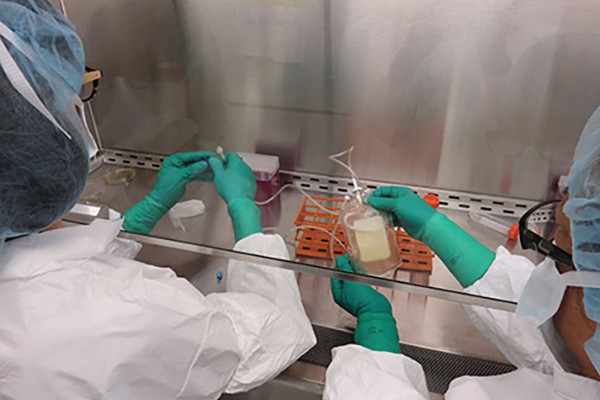Cells’ lack of glucose dulls immune system’s ability to fight cancers
Cancers have many strategies for avoiding attacks from the immune system. But the more scientists are able to understand about them, the more effectively they will be able to use the immune system to fight cancer. To that end, researchers at Washington University School of Medicine in St. Louis have identified a new strategy.
New technology may reduce deadly complication of bone marrow transplants
Researchers led by John F. DiPersio, MD, PhD, at the School of Medicine have designed a way to mitigate graft-versus-host disease, a common and often life-threatening complication of bone marrow transplants that are used to treat leukemia and other blood cancers. The method also employs a molecular imaging tool to help doctors identify patients most likely to develop this dangerous condition.
Personalized melanoma vaccines marshal powerful immune response
Personalized melanoma vaccines can be used to marshal a powerful immune response against unique mutations in patients’ tumors, according to early data in a first-in-people clinical trial at Washington University School of Medicine in St. Louis. The research is a boost to cancer immunotherapy, a treatment strategy that unleashes the immune system to seek out and destroy cancer.
Unanue receives lifetime achievement award
Emil Unanue, MD, the Paul and Ellen Lacy Professor of Pathology and Immunology, has received the Lifetime Achievement Award from the American Association of Immunologists. The award is the organization’s highest honor.
Investigational cancer drugs unintentionally may result in tumor growth
School of Medicine researchers studying how cancer spreads into bone have made a surprising discovery that suggests several investigational anti-cancer therapies just entering the drug-development pipeline may not have the desired effect. The study indicates that the drugs inadvertently may promote cancer.
Deadly complication of stem cell transplants reduced in mice
Studying leukemia in mice, John F. DiPersio, MD, PhD, and his colleagues at Washington University School of Medicine in St. Louis, have reduced a life-threatening complication of stem cell transplants, the only curative treatment when leukemia returns.
Key signal prepares immune cells to defend skin, brain
Scientists at Washington University School of Medicine
in St. Louis have identified the molecular signal that triggers the
development of immune cells that patrol the skin and brain.
Timing, duration of biochemical bugle call critical for fighting viruses
Researchers have identified the primary player of the
biochemical bugle call that musters the body’s defenders against viral
infection. Scientists at Washington University School of Medicine
in St. Louis have shown that a key molecule, MDA5, is essential for
producing enough interferon (the bugle call) to rally virus-fighting
cells during certain viral infections.
Late-stage sepsis suppresses immune system
Patients who die from sepsis are likely to have had suppressed immune systems that left them unable to fight infections, researchers at Washington University School of Medicine in St. Louis have shown. The findings suggest that therapies to rev up the immune response may help save the lives of some patients with the disorder.
‘Leash’ protein may help keep B cells from attacking body tissue
B cellsScientists at the School of Medicine have identified a protein that can reduce the chances immune B cells will erroneously attack the body’s own tissues, causing autoimmune disorders like lupus, allergies, arthritis and diabetes. The protein is the first of its kind to be identified in B cells and could provide scientists with a new target for treating such conditions.

